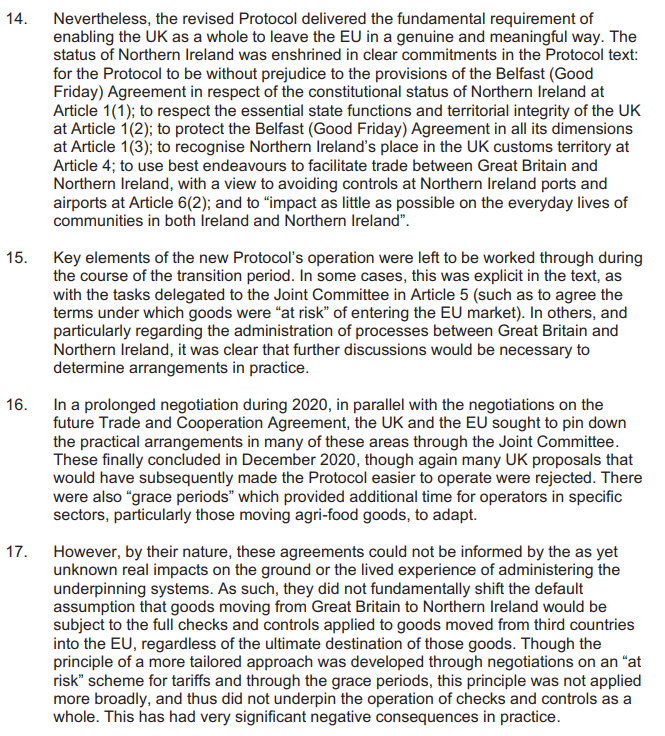
I'm going to go through this once again, today mainly because 'we didn't realise how the Northern Ireland Protocol would work in practice' is no grounds for trying to get out of your treaty commitments
1/
1/
https://twitter.com/Usherwood/status/1306888617542004737
This argument's popped up today in the morning media round
2/
https://twitter.com/Haggis_UK/status/1418097570958749699?s=20
2/
We'll leave to one side how anyone could sign up to anything they didn't really understand, because that's beside the point of international law
3/
3/
The thread in my OP unpacks the principle of pacta sunt servanda, which is fundamental to how treaties work
Without it, no treaty would have any meaning at all
(obviously a problem, even for the hardest of Brexiters, who might see value in things like NATO, WTO, etc.)
4/
Without it, no treaty would have any meaning at all
(obviously a problem, even for the hardest of Brexiters, who might see value in things like NATO, WTO, etc.)
4/
Now pacta sunt servanda isn't complicated to understand (if you sign up to something, you commit to it, unless really exceptional circumstances intervene)
But it's proving hard for some to get their heads around
So let's try a simpler version
caveat emptor, or buyer beware
5/
But it's proving hard for some to get their heads around
So let's try a simpler version
caveat emptor, or buyer beware
5/
You know this, even if you don't know this
For once in my life, I'll send you off to the Mail to read about 'the dangers of not reading the small print' when buying online
dailymail.co.uk/femail/article…
6/
For once in my life, I'll send you off to the Mail to read about 'the dangers of not reading the small print' when buying online
dailymail.co.uk/femail/article…
6/
It's the same principle: you're entering a contract, so it's on you to check that contract is what you want/need and that you suffer the consequences
7/
7/
In both shopping and treaty-making there are general rules about what's allowed: essentially stuff about good faith and no coercion
But the key bit is that you cannot outsource the consequences of your decisions
8/
But the key bit is that you cannot outsource the consequences of your decisions
8/
Yesterday's Command Paper on the Protocol was an attempt to do just that: outsource
Lots of words about how difficult it's been and how unusual
(you can see my further thoughts on this:
9/
Lots of words about how difficult it's been and how unusual
(you can see my further thoughts on this:
https://twitter.com/Usherwood/status/1418091498965438464?s=20)
9/
Yes, Northern Ireland is unusual and so is the solution chosen (the Protocol), but that's not a reason for the solution to be broken from
Indeed, you could argue it's precisely why you stick to it
10/
Indeed, you could argue it's precisely why you stick to it
10/
You might have noticed that Northern Ireland's situation was the subject of some* discussion prior to the signing of the Withdrawal Agreement in 2019
Including a renegotiation of precisely that Protocol by Johnson in the autumn of that year
* - lots
11/
Including a renegotiation of precisely that Protocol by Johnson in the autumn of that year
* - lots
11/
The issue of how to manage the trilemma of the needs of the GFA, UK territorial integrity and the EU's single market was thrown around many, many, many times and the outcome was the one that was decided to be least worst and which both UK and EU signed up to
12/
12/
Which is a long way of saying that it's literally unbelievable that the UK govt didn't know how this would play out
And, again, under pacta sunt servanda, that is still irrelevant: the treaty was signed and ratified, so it stands
13/
And, again, under pacta sunt servanda, that is still irrelevant: the treaty was signed and ratified, so it stands
13/
In short: it wasn't all a dream and you don't get to pretend the last season didn't happen
[kids, you can ask your parents about this]
/end
[kids, you can ask your parents about this]
/end
• • •
Missing some Tweet in this thread? You can try to
force a refresh







